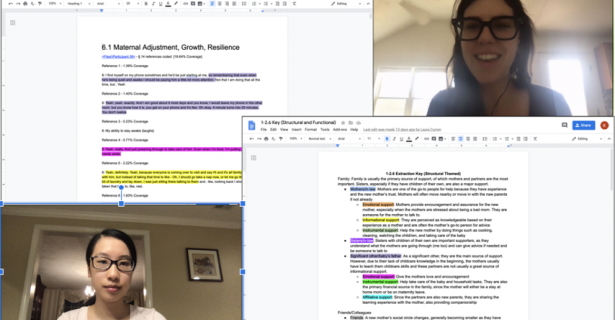For the past couple of months, I have been working with Laura Curren, a psychology graduate student at Boston University, on her research on maternal adjustment and postpartum depression. This research is part of the THRIVE (Transgenerational Health Research Initiative) study at BU’s Family Development and Treatment Lab, which examines how the health of different generations is affected by genes and environment.
Although Laura is working on multiple projects, the project that I have been primarily working with is her research examining maternal adjustment in low-income mothers. Low-income mothers are at a higher risk of developing mental health issues (such as postpartum depression) and negative parenting outcomes than middle- or high- income mothers and have more limited access to health and parenting resources. This study also examines more closely the social support and development of maternal role/identity aspects of maternal adjustment.
The majority of my work has been doing literature reviews and data analysis. For literature reviews, I use online databases to find and read relevant articles on maternal adjustment, some of which will be cited in Laura’s paper. Data analysis also played a large part of my internship experience. For this study, I worked with the interviews of 25 new mothers and identified common themes relating to maternal role/identity development and social support, specifically how mothers’ relationships have changed during their postpartum adjustment period.
While each interview described the unique experiences and backgrounds of the different mothers, many of the mothers faced similar challenges involving childcare skills and knowledge, along with emotional stress. These challenges were also described in many of the other papers on maternal adjustment that I have read. I was surprised to learn that for something so common that affects mothers all over the world, there are many things that are still unknown about this transition, emphasizing the need for more research and intervention programs.
As I near the end of my summer internship, I am grateful for this amazing opportunity to take part in important research while learning new skills that I will no doubt use in the future. In addition to getting better at database navigation and analyzing papers and data, I have gotten the chance to learn how to use new data software and write grants for research funding. One of the most interesting experiences I have had during this internship is being able to edit a paper that was about to be published using peer review comments. This was the first time that I had gotten an up-close look into the publication process.
I hope to have a career in medical research or healthcare, so this internship was a great opportunity to see how psychology research is done. I was excited that the research focused on women’s mental health because many common disorders (such as depression and anxiety) affect men and women differently and these differences are not completely understood. Moreover, men do not go through maternal adjustment and its challenges like women do when they have a new child (although they do experience their own paternal transition). I am glad to have contributed to research essential to developing a better understanding of maternal mental health, and further used to develop education and intervention programs to fit the needs of new mothers everywhere.
Alumna Biz Herman and colleague Laura Curren provided this remote internship.

